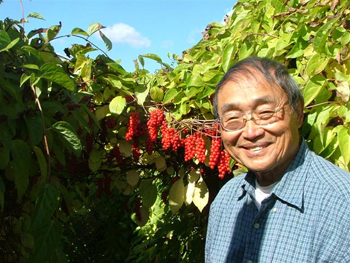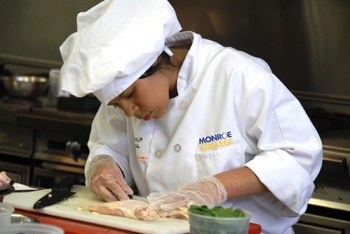Effective Classroom Management
Advanced planning, organization, preparation, creativity, flexibility and solid content knowledge are all necessary to challenge students and let them know what is expected of them.
By Bradley J. Ware, Ph.D., and C. Lévesque Ware, Ph.D.
Effective classroom management is possible when strategies that facilitate learning and reduce disciplinary problems are implemented. Solutions that can positively contribute to reaching this goal include: preparing a well-thought-out syllabus that carefully delineates student accountability; using a system of evaluation that de-emphasizes individual grading; and including course work that is both relevant and challenging.
The Course Syllabus
A syllabus is a document that explains a course in detail. It provides students with precise information concerning what must be done to successfully complete a course. An organized syllabus sets the tone of the course and relays that the instructor is prepared and in control. A good syllabus clearly spells out the instructor’s expectations and should therefore be presented on the first day of class. When reviewing the syllabus with students it is important to make sure that they understand the rationale behind each rule, regulation and policy, and the reasons why these are critical to the overall success of the lab/class. A well-worded, clear syllabus can greatly reduce the occurrence of disciplinary problems.
De-emphasizing Individual Grades
In most colleges and university courses, instructors use quizzes, midterms and final exams as their primary evaluative criteria. Unfortunately, individual graded exams often cause fear and anxiety among students and create a competitive atmosphere that divides excellent students and marginal students. Using hybrid forms of these instruments can reduce test anxiety and provide greater opportunities for student success. A midterm or final exam might include a section that contains essay questions that are prepared at home prior to the in-class portion of the exam. “Take home” exams allow students to plan, prepare and organize their essays in advance, reducing the pressure of time constraints. The inclusion of a collection of essays from which students select a predetermined number and develop these is another option. Students might be asked to select and develop three essays from the five presented.

 Following the recommendations identified by the acronym, WARM, you can inspire students to reach for ultimate success from the moment they return to or begin their training.
Following the recommendations identified by the acronym, WARM, you can inspire students to reach for ultimate success from the moment they return to or begin their training. Students in teams don’t necessarily have to like each other, says Chef Weiner. They won’t have the luxury of choosing their teammates in the real world, after all. But they do have to learn to work together to execute a successful meal. Here are proven tips to teach them how.
Students in teams don’t necessarily have to like each other, says Chef Weiner. They won’t have the luxury of choosing their teammates in the real world, after all. But they do have to learn to work together to execute a successful meal. Here are proven tips to teach them how. Dr. Tso-Cheng Chang was a pioneer of “no pesticides or herbicides” farming in the United States. His farm, which grows vegetables for his award-winning restaurant in Amherst, Mass., not only is one of the largest bean-spout producers in the nation, it also grows schizandra berries—which might be the ginseng of this decade.
Dr. Tso-Cheng Chang was a pioneer of “no pesticides or herbicides” farming in the United States. His farm, which grows vegetables for his award-winning restaurant in Amherst, Mass., not only is one of the largest bean-spout producers in the nation, it also grows schizandra berries—which might be the ginseng of this decade. OMNI-TV host and associate producer Lucy Zilio visited the Culinary Arts Centre at Centennial College in Toronto recently to take in the sights and aromas of a live kitchen lesson. In a video (110 seconds) on the program’s website, Zilio speaks with chef and professor Samuel Glass about the special focus Centennial’s program places on international cuisine. Visit
OMNI-TV host and associate producer Lucy Zilio visited the Culinary Arts Centre at Centennial College in Toronto recently to take in the sights and aromas of a live kitchen lesson. In a video (110 seconds) on the program’s website, Zilio speaks with chef and professor Samuel Glass about the special focus Centennial’s program places on international cuisine. Visit  Chef Reginald Martin, culinary-arts instructor at Westside High School in Houston, Texas, is the recipient of the Texas Restaurant Association Education Foundation’s 2013 Educator Excellence Award. Martin has been leading Westside’s program since 2008 and has more than 100 students enrolled in the program.
Chef Reginald Martin, culinary-arts instructor at Westside High School in Houston, Texas, is the recipient of the Texas Restaurant Association Education Foundation’s 2013 Educator Excellence Award. Martin has been leading Westside’s program since 2008 and has more than 100 students enrolled in the program.  The great work of chefs and those in the hospitality industry is often gone once guests leave the restaurant, but a new Hall of Fame at the esteemed Le Cordon Bleu College of Culinary Arts in Chicago will showcase the work of the best in the industry. Le Cordon Bleu in Chicago has been chosen to house the new International Food & Beverage Forum “Hall of Fame.”
The great work of chefs and those in the hospitality industry is often gone once guests leave the restaurant, but a new Hall of Fame at the esteemed Le Cordon Bleu College of Culinary Arts in Chicago will showcase the work of the best in the industry. Le Cordon Bleu in Chicago has been chosen to house the new International Food & Beverage Forum “Hall of Fame.” Gabriela Grande, a culinary-arts student at Monroe College in the Bronx, N.Y., has added a victory in the “Lead Like Mike” competition to her list of impressive culinary accomplishments. Grande was the 2010 America’s Best High School Chef winner, a C-CAP student from Food and Finance High School, and the first Monroe culinary student to compete at the American Culinary Federation’s Northeast Regional Conference, where she won a gold medal and finished second overall.
Gabriela Grande, a culinary-arts student at Monroe College in the Bronx, N.Y., has added a victory in the “Lead Like Mike” competition to her list of impressive culinary accomplishments. Grande was the 2010 America’s Best High School Chef winner, a C-CAP student from Food and Finance High School, and the first Monroe culinary student to compete at the American Culinary Federation’s Northeast Regional Conference, where she won a gold medal and finished second overall.